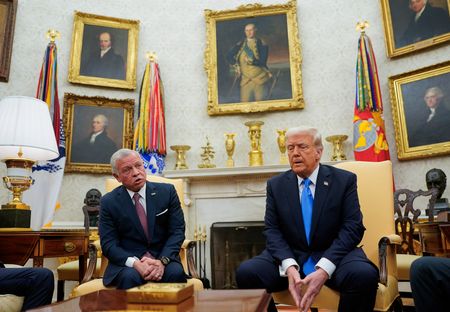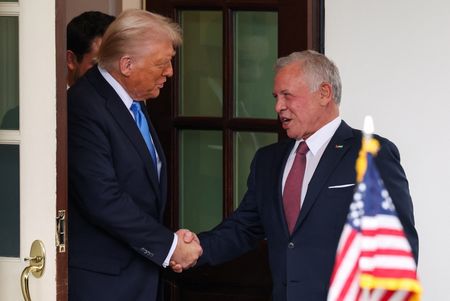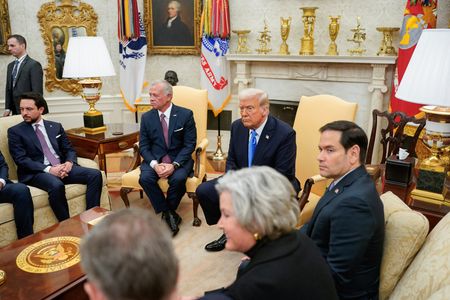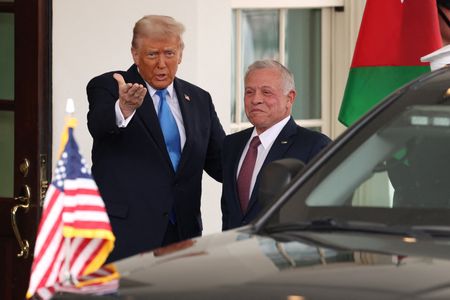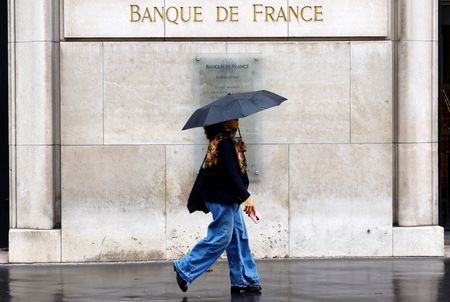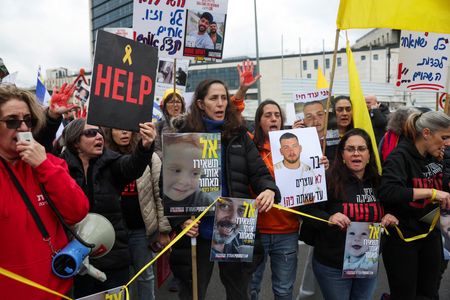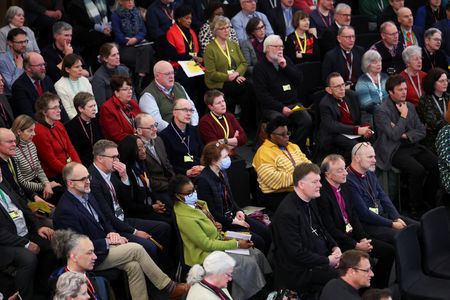By Jeff Mason and Simon Lewis
WASHINGTON (Reuters) -Donald Trump restated his plan for the U.S. to take over Gaza during a meeting with Jordan’s King Abdullah on Tuesday and insisted that Jordan would house displaced Palestinians, despite the king’s opposition to the proposal.
The U.S. president, speaking alongside the Arab country’s ruler in the Oval Office, signaled he would not budge on his idea that involves moving the Gaza Strip’s shell-shocked residents and transforming the war-ravaged territory into what he billed a “Riviera of the Middle East.”
Trump has infuriated the Arab world by saying that Palestinians would not have the right of return to their homes under his proposal to redevelop the enclave, which has been devastated by an Israeli offensive.
“We’re going to take it. We’re going to hold it, we’re going to cherish it. We’re going to get it going eventually, where a lot of jobs are going to be created for the people in the Middle East,” Trump said in the Oval Office, saying his plan would “bring peace” to the region.
Despite the views of his Jordanian counterpart, Trump said Jordan, as well as Egypt, would ultimately agree to house displaced Gazans. Both countries rely on Washington for economic and military aid.
“I believe we’ll have a parcel of land in Jordan. I believe we’ll have a parcel of land in Egypt,” said Trump. “We may have someplace else, but I think when we finish our talks, we’ll have a place where they’re going to live very happily and very safely.”
Trump, who has suggested he could consider withholding aid to Jordan, said he was not using support as a threat.
“We contribute a lot of money to Jordan, and to Egypt by the way – a lot to both. But I don’t have to threaten that. I think we’re above that,” Trump said.
King Abdullah has previously said he rejects any moves to annex land and displace Palestinians.
While the two leaders were cordial with each other, Trump’s comments about Gaza put King Abdullah in an awkward position, given the sensitivity in Jordan of the Palestinians’ claim of a right to return to the lands that many fled during the war that surrounded the creation of Israel in 1948.
Trump at one point appeared to prompt King Abdullah to say he would take in Palestinians from Gaza, but the king said he would do what is best for his country, and said Arab nations would come to Washington with a counterproposal.
“The point is how to make this work in a way that is good for everybody,” he said, appearing uncomfortable, without explicitly supporting or opposing Trump’s plan.
Jordanian officials ahead of the talks said they wanted to avoid a public engagement where Trump would put the king on the spot, and the remarks inside the Oval Office were not planned.
He was expected to tell Trump such a move could spur radicalism, spread chaos in the region, jeopardize peace with Israel and threaten the country’s very survival. The two spoke in front of reporters with the king’s son, Crown Prince Hussein, Secretary of State Marco Rubio, Jordan’s Foreign Minister Ayman Safadi and other officials also present.
Sandwiched between Saudi Arabia, Syria, Israel and the occupied West Bank, Jordan is already home to more than 2 million Palestinian refugees in its population of 11 million, their status and number long providing a source of anxiety for the country’s leadership.
Amman is also reeling from Trump’s 90-day aid pause. Israel and Egypt have been granted waivers, but the $1.45 billion Jordan gets each year remains frozen pending a Trump administration review of all foreign aid.
‘ALL BETS ARE OFF’
Trump’s proposal has introduced new complexity into a sensitive regional dynamic, including a fragile ceasefire between Israel and the Palestinian militant group Hamas.
Hamas on Monday said it would stop releasing Israeli hostages from Gaza until further notice, saying Israel was violating the agreement to end strikes that have pummeled Gaza. Trump later proposed canceling the ceasefire if Hamas doesn’t release all remaining hostages it took on October 7, 2023, by Saturday.
Trump said on Tuesday that “all bets are off” if Hamas does not meet the deadline, adding that he does not think the Palestinian militant group will do so.
Three out of four Americans — 74% — in a Reuters/Ipsos poll conducted February 7-9 said they opposed the idea of the U.S. taking control of Gaza and displacing the Palestinians who live there. The poll showed that Republicans were divided on the issue, with 55% opposed and 43% supportive.
(Reporting by Jeff Mason, Simon Lewis and Trevor Hunnicutt in Washington and Suleiman al-Khalidi in Amman; Editing by Colleen Jenkins, Lincoln Feast and Alistair Bell)


